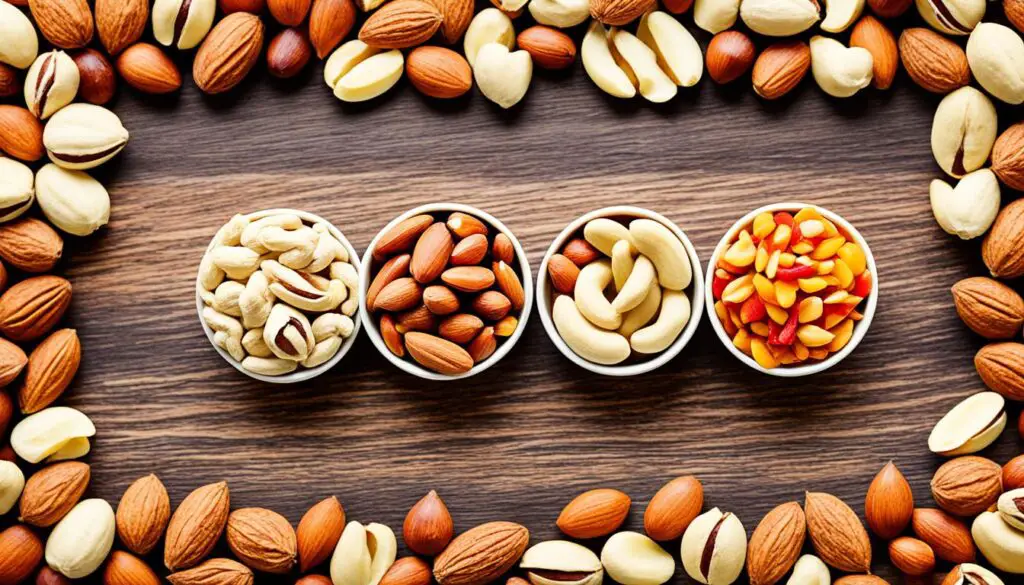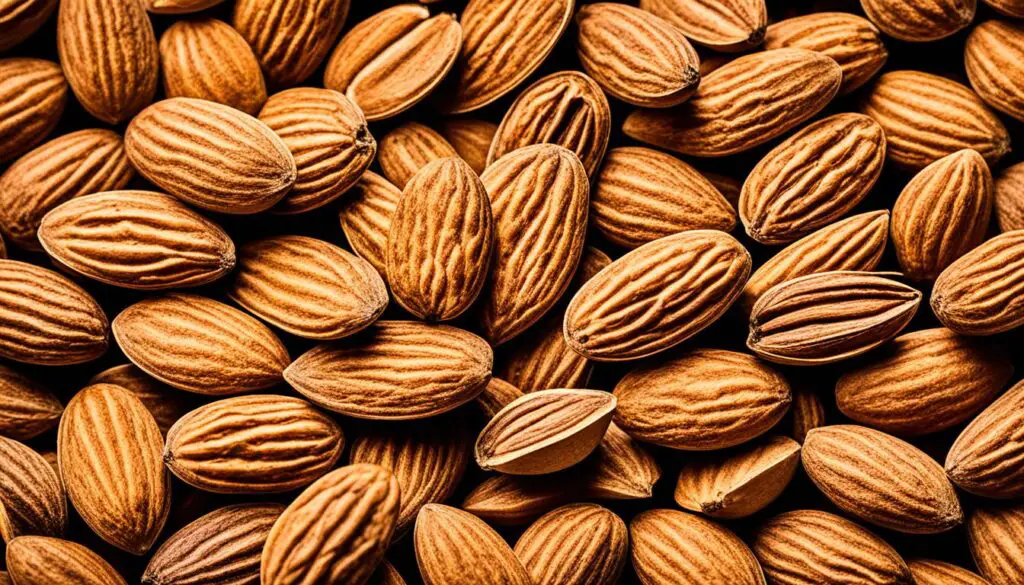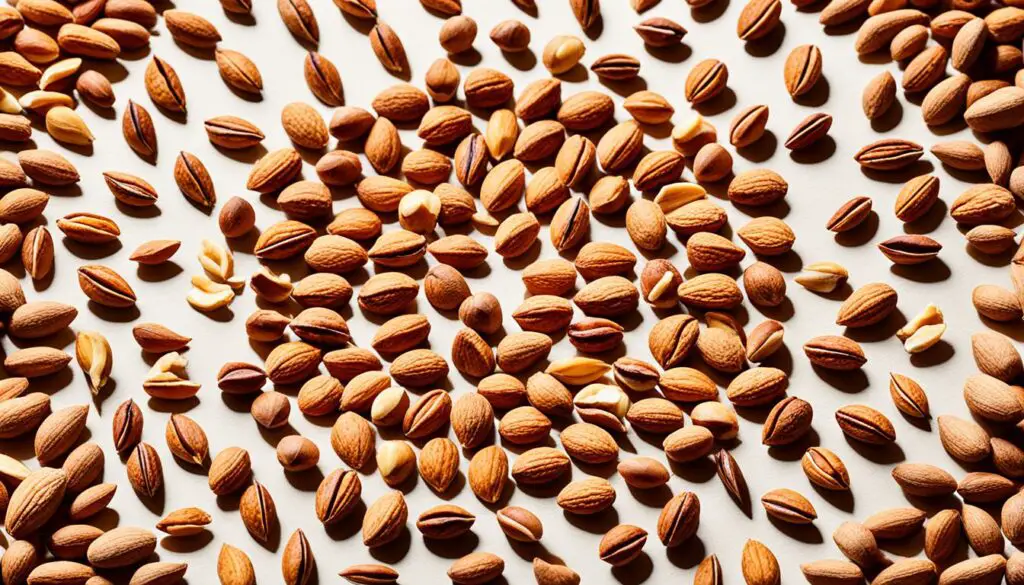Imagine walking through a busy farmer’s market, filled with the smell of fresh nuts. You see almonds, pistachios, walnuts, cashews, and pecans, each with its own health perks. These snacks are great for a healthy body and can lower the risk of some diseases.
Nuts are tasty and full of good stuff like fiber, antioxidants, vitamins, minerals, healthy fats, and protein. Adding them to your meals can help you stay at a healthy weight, keep your heart strong, and even lower the risk of type 2 diabetes and some cancers. Let’s look at the top five nuts you should eat for your health.
Key Takeaways
- Nuts are a nutrient-dense snack that can support overall health and reduce the risk of chronic diseases.
- The top five healthy nuts to include in your diet are almonds, pistachios, walnuts, cashews, and pecans.
- Nuts are a good source of heart-healthy fats, fiber, protein, vitamins, and minerals.
- Incorporating a variety of nuts into your diet can help maintain a healthy weight and support cardiovascular health.
- Moderation is key when it comes to nut consumption, as too many can lead to excess calorie and nutrient intake.
Introduction
Nuts are a tasty and healthy snack full of good stuff like fiber, antioxidants, vitamins, minerals, healthy fats, and protein. Eating nuts can help keep your weight healthy and lower the risk of heart disease.
Nuts: A Nutritional Powerhouse
Nuts are packed with vitamins, minerals, and other good stuff. They have a lot of fiber, which is good for your digestion and gut health. They also have healthy fats that can lower cholesterol and reduce heart disease risk.
Nuts are a great source of plant-based protein. This is good for vegetarians and vegans, and for anyone wanting more protein.
The Benefits of Eating Nuts
Eating nuts regularly has many health benefits. Studies show that a daily handful of nuts can help keep your weight healthy and lower cholesterol. Nuts can also increase your metabolism, helping you burn more calories all day.
People who eat nuts often have a lower risk of dying early. This is because nuts are full of health-boosting properties.
“Around two handfuls of nuts each day may assist with cholesterol lowering without affecting weight.”

If you want to improve your health, manage your weight, or just enjoy a tasty snack, nuts are a great choice. They come in many flavors and textures, making them a versatile and satisfying part of a healthy diet.
Almonds: A Nutrient Powerhouse
Almonds are a superfood full of vitamins, minerals, and nutrients. They are packed with vitamin E, magnesium, and manganese. These nutrients are key for a strong immune system, good cell communication, and fighting off free radicals.
Almonds are also great for your health. They can lower the risk of heart disease by reducing cholesterol and improving heart health. Plus, they help your gut by supporting good bacteria with their fiber.
Almonds: A Nutritional Powerhouse
- A 1-ounce serving of almonds contains 3.5g of fiber, 6g of protein, and 14g of fat (9 of which are monounsaturated).
- Almonds provide 48% of the daily value (DV) of vitamin E per 1-ounce serving, a nutrient that plays a crucial role in immune function and antioxidant protection.
- Almonds offer 27% of the DV for manganese and 18% of the DV for magnesium in a 1-ounce serving, supporting cellular communication and overall health.
Almonds and Heart Health
Eating almonds can lower your risk of heart disease. Studies show they can reduce LDL (bad) cholesterol and oxidized LDL cholesterol. These are both risk factors for heart disease.
| Benefit | Statistic |
|---|---|
| Reduced LDL Cholesterol | Eating almonds can lead to mild reductions in LDL cholesterol levels. |
| Decreased Oxidized LDL | Snacking on almonds for a month can lower oxidized LDL cholesterol levels by 14%. |
Almonds and Gut Health
Almonds can also help your gut by supporting good bacteria. Their fiber and prebiotic properties keep your microbiome balanced. This is key for your digestive and immune health.

“Incorporating almonds into your daily routine is an easy way to boost your nutrient intake and support your overall health.”
Pistachios: Rich in Antioxidants and Phytosterols
Pistachios are a nutrient-packed nut with many health benefits. They are full of antioxidants and phytosterols. These can improve your health.
Antioxidants in pistachios help fight inflammation and stress in the body. This can lower the risk of heart disease, cancer, and diabetes. Phytosterols are plant compounds that can lower cholesterol and support heart health.
Eating pistachios is a smart way to get more of these good compounds. A study in 2014 showed that eating pistachios can improve how your body handles sugar, insulin use, and inflammation. Another study in 2012 found that pistachios can lower blood pressure and reduce stress on blood vessels in people with high cholesterol.
You can enjoy pistachios as a snack, on salads, or in various dishes. Pistachios are a versatile and nutritious choice. They are full of vitamins, minerals, and healthy fats, making them great for your health.
“Pistachios are a nutrient-dense nut that are particularly rich in antioxidants and plant compounds called phytosterols.”
Top Five Nuts to Include in Your Diet
Nuts are great because they come in many flavors and textures. They are full of nutrients, making them a key part of a healthy diet. Almonds and walnuts are packed with antioxidants, while others are rich in healthy fats and proteins.
A Flavorful Feast of Nuts
Almonds, pistachios, walnuts, cashews, and pecans are the top five nuts you should eat. Each nut has its own special nutrients. They can help with heart health, brain function, or just make a tasty snack.
These top five healthy nuts are great for anyone looking to eat better.
- Almonds: Rich in vitamin E, magnesium, and manganese, supporting immune function, cellular communication, and antioxidant protection.
- Pistachios: Packed with antioxidants and phytosterols, providing a nutritious boost to your diet.
- Walnuts: An excellent source of omega-3 fatty acids, which may improve brain function and reduce risk factors for dementia and heart disease.
- Cashews: A good source of plant-based protein, minerals like iron and zinc, and heart-healthy monounsaturated fats.
- Pecans: Loaded with antioxidants and plant sterols, offering a delightful and nutrient-dense addition to your meals.
Eating this variety of nuts can make your diet more balanced. You can enjoy them roasted, raw, or as a topping. These top five healthy nuts are easy and tasty ways to get more nutrients.
“Nuts are a delicious and nutritious snack packed with fiber, antioxidants, vitamins, minerals, healthy fats, and protein.”
Walnuts: Brain and Heart Health Boosters
Walnuts are a superfood for brain and heart health. They are packed with omega-3 fatty acids, especially alpha-linolenic acid (ALA). Studies show that omega-3s in walnuts can boost brain function and lower the risk of cognitive decline and dementia.
These nuts also have healthy fats that can lower cholesterol and blood pressure. Large studies found that eating 5 or more ounces of nuts weekly can cut the risk of heart disease and death by 35% to 50%.
| Nutrient | Benefits |
|---|---|
| Omega-3 Fatty Acids | Improve brain function and reduce risk factors for cognitive decline and dementia |
| Healthy Fats | Help lower cholesterol and blood pressure, supporting heart health |
Eating just a quarter of a cup of walnuts can boost your brain and prevent mental decline. They are full of omega-3 fats. Walnuts also improve cognitive function, memory, and lower Alzheimer’s disease risk.
“Eating walnuts is linked with improved cognitive function and memory, as well as a reduced risk of Alzheimer’s disease.”
Adding walnuts to your daily diet can help your brain and heart. Their unique nutrients support overall health and well-being.
Cashews: A Versatile Nut for Plant-Based Diets
If you’re on a plant-based diet, cashews are a great choice. They are creamy and mild, offering about 5 grams of protein per ounce. They also have important minerals like copper, magnesium, phosphorus, and zinc.
Cashews are very versatile. You can make creamy sauces, dips, and dairy-free cheeses with them. They’re also tasty on their own, providing heart-healthy monounsaturated fats.
Adding cashews to your meals is simple. You can put them on salads, blend them into smoothies, or use them in vegan desserts. Their mild taste makes them easy to mix with other foods, making them a handy choice for a plant-based diet.
“Cashews are a versatile nut that can be a great addition to plant-based diets. They are a good source of plant-based protein, as well as minerals like iron and zinc that are important for overall health.”
Pecans: Packed with Antioxidants and Plant Sterols
Pecans are a nutrient-dense nut full of antioxidants and plant sterols. They have vitamin E, zinc, and manganese, which protect cells and reduce inflammation. Pecans also have plant sterols that are like cholesterol but help lower bad cholesterol, supporting heart health. Adding pecans to your meals boosts your intake of these important nutrients.
Pecans are among the top foods for antioxidants. Studies show they are in the top 15 for antioxidant levels. This makes them a strong ally against cancer and heart disease.
Pecans are a great plant-based protein source, offering over 19 vitamins and minerals. They are rich in heart-healthy antioxidants and plant sterols, giving them a unique taste and many health benefits.
| Nutrient | Amount in Pecans (per 1 oz serving) |
|---|---|
| Calories | 196 |
| Total Fat | 20 g |
| Saturated Fat | 2 g |
| Monounsaturated Fat | 12 g |
| Polyunsaturated Fat | 4 g |
| Protein | 3 g |
| Carbohydrates | 4 g |
| Fiber | 3 g |
| Magnesium | 34 mg |
| Potassium | 116 mg |
Pecans are versatile and can be used in many ways. You can bake them into pies and cookies or add them to salads and yogurt. They are a tasty and healthy snack that fits easily into your daily meals.
“Pecans are a powerhouse of antioxidants and plant sterols, making them a must-have for anyone looking to support their heart health and overall well-being.”
Conclusion
Adding different nuts to your diet is easy and helps your health. Almonds and pecans are great examples. They are full of nutrients and antioxidants. Including almonds, pistachios, walnuts, cashews, and pecans in your diet can make you healthier.
These nuts are good for your heart, brain, and blood sugar levels. They also make a tasty snack. Nuts have healthy fats, fiber, and important vitamins and minerals. This makes them a great food to add to many meals and snacks.
Don’t be afraid to try different nuts and see how they can improve your health. Enjoy the best nuts and add them to your meals for better nutrition.



